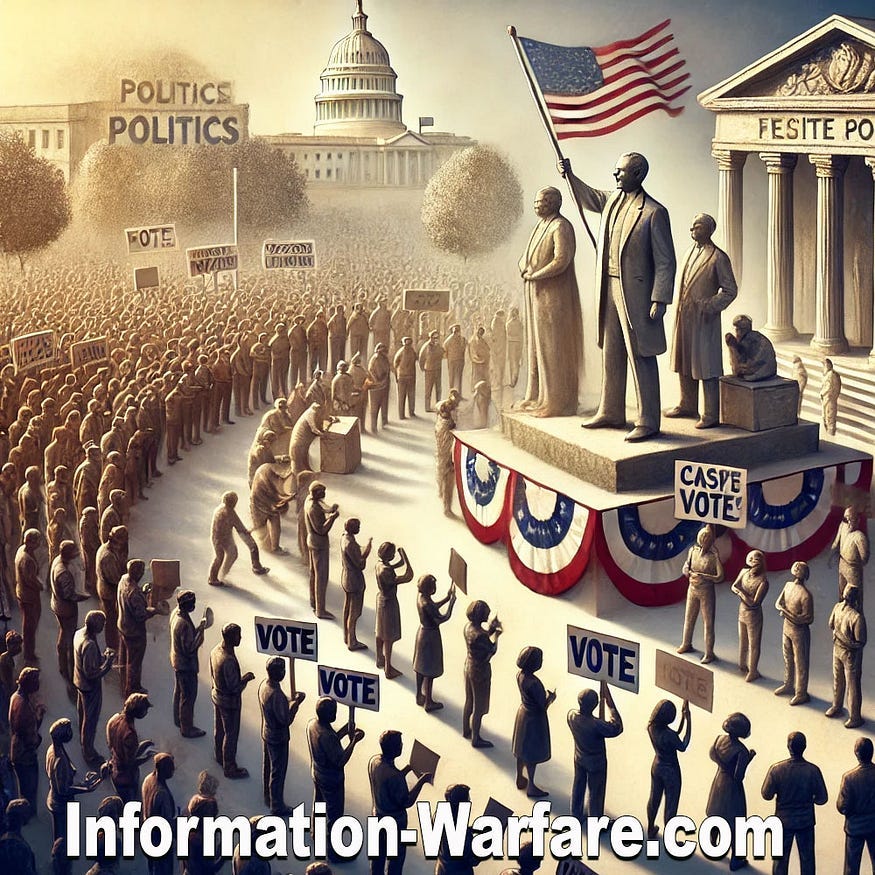Pandering Politicians and the Power of the Public
How Informed Citizens Can Break the Cycle of Political Pandering and Shape a Better Future

In today’s political landscape, it’s no secret that politicians often pander to the public. They shape their messages, policies, and even their personas based on what they believe will resonate most with voters. This strategy, while effective in gaining support, often leads to the reinforcement of harmful biases, misinformation, and divisiveness. If Americans continue to fall for the trappings of the internet — such as misinformation, prejudice, and polarization — politicians will have little incentive to change their tactics. The key to breaking this cycle lies in intellectual enlightenment and rising above the biases that cloud our judgment.
Intellectual enlightenment is the process of expanding one’s understanding, critical thinking, and awareness through the pursuit of knowledge, truth, and self-reflection. It involves rising above superficial biases, prejudices, echo chambers, and preconceived notions to gain a deeper, more nuanced understanding of the world. Intellectual enlightenment encourages individuals to question the status quo, seek evidence-based answers, and engage in open-minded dialogue. It is about cultivating wisdom, empathy, and the ability to see beyond divisive rhetoric, enabling us to make decisions that are informed, just, and beneficial for the collective good. By embracing intellectual enlightenment, we can break free from the cycle of pandering and create a society that values truth and thoughtful discourse over manipulation and fear.
The Cycle of Pandering
Politicians, by the very nature of their profession, are in the business of winning public favor. To achieve this, they often tailor their messages to what they perceive the public wants to hear, rather than what is necessarily true, just, or beneficial in the long term. This pandering can take many forms, from fearmongering about immigration to stoking cultural wars over issues like race and gender.
For instance, when political figures see that certain inflammatory rhetoric gains traction online or energizes a particular base, they are more likely to adopt and amplify those messages. This creates a feedback loop: politicians pander to the public’s perceived desires, which in turn reinforces those desires and drives the cycle of pandering even further.
The Influence of Misinformation and Divisiveness
The internet has become a powerful tool for spreading information — but also for spreading misinformation and divisive content. Social media platforms, in particular, are designed to prioritize engagement, often at the expense of truth and nuance. As a result, sensationalized, polarizing content spreads more rapidly and widely than measured, fact-based discourse.
This environment creates fertile ground for politicians who seek to exploit public fears and prejudices. When people are bombarded with biased or false information, they are more likely to develop and hold onto divisive views. Politicians, in turn, pander to these views, knowing that doing so will secure them votes or increase their popularity.
The Public’s Role in Shaping Politics
While it’s easy to place the blame on politicians for pandering, it’s crucial to recognize that the public plays a significant role in shaping political strategies. Politicians give the public what they think the public wants — if the electorate demands substance and integrity, politicians will adjust their strategies accordingly. However, if the public rewards demagoguery, hate-mongering, or empty rhetoric, politicians will continue to pander to those instincts.
Consider the example of Donald Trump. His rise to political prominence was largely fueled by his ability to tap into the frustrations and fears of a segment of the American population. His rhetoric, often filled with misinformation and divisive language, resonated with many voters, leading the Republican Party to rally behind him. If the public had instead seen through his bluster and rejected his tactics, it’s likely that his influence within the party would have waned. The public’s response to political figures directly influences the direction of political parties.
The Need for Intellectual Enlightenment
The antidote to the cycle of pandering and the spread of misinformation lies in intellectual enlightenment. This means cultivating a society where individuals critically evaluate the information they consume, seek out diverse perspectives, and prioritize truth and integrity over sensationalism. It requires a collective effort to rise above the biases that so often cloud judgment and to demand more from our leaders.
Intellectual enlightenment is not just about being informed — it’s about being wise. It’s about recognizing when politicians are exploiting fears for their own gain and refusing to reward them for it. It’s about holding politicians accountable for their actions and rhetoric and insisting that they address the real issues facing our nation rather than pandering to our worst instincts.
A Call to Action
If Americans want to see a change in the way politics is conducted, the change must start with the public. By rejecting the trappings of the internet — misinformation, prejudice, and divisiveness — and embracing intellectual enlightenment, we can shift the political landscape. Politicians will always cater to the demands of the electorate; if the electorate demands substance, integrity, and truth, politicians will have no choice but to respond.
We have the power to break the cycle of pandering and to create a political environment where leaders are chosen for their ability to unite, inspire, and lead with wisdom. But this requires a commitment from each of us to rise above the noise, to question what we are told, and to seek out the truth, even when it’s uncomfortable.
The future of our democracy depends on an enlightened electorate — one that refuses to be swayed by empty rhetoric and demands more from those who seek to lead us. By laughing off figures who pander to our base instincts and rejecting the frauds and hate-mongers, we can pave the way for leaders who truly reflect the best of what America can be. The choice is ours: to be passive consumers of political pandering, or to rise above and shape the future of our nation with wisdom and integrity.

